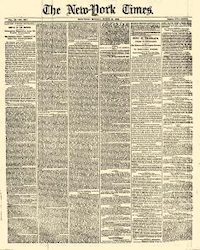The New York Times, June 19, 1860
HUNTSVILLE, June 13, 1860.
MY DEAR SIR: I see that Mr. SUMNER, in his late speech, thought proper to pay his respects to me. He calls me a slave owner, and quotes a part of my speech in reply to Mr. RHETT, to prove that violent and bloody instincts are engendered by the relation of master and slave. It may surprise Mr. SUMNER to learn that I have never been the owner of a slave. I have never been engaged in any pursuit or avocation in which slave labor would have been the slightest benefit to me, and I have never been able to buy slaves for the mere purpose of waiting upon me. There is a negro man here with whom I was raised—who has lived with me a great deal, and who was with me throughout the Mexican war, but the title to him was not in me—it was in my father; and if Mr. SUMNER will ask any of the surviving officers or soldiers of the 9th Infantry, (all of whom were from New-England,) I think they will tell him that it was a matter of some doubt whether I belonged to the negro, or he belonged to me.
At all events, if Mr. SUMNER will send here in one month double the sum that negro would bring if offered for sale, he could not induce him to touch it, with a condition annexed, that he should live in Massachusetts as a freeman. Mr. SUMNER may find some apology for the bitterness of his late speech, in the chastisement inflicted upon him by the lamented BROOKS, but the ignorance he displays of Southern manners and Southern society, can hardly be accounted for on the same ground. If he had passed half the time among us, years ago, which he spent among the English Abolitionists, he would have escaped the caning, as well as the more disgraceful exhibition he has now made of himself.
JERE CLEMENS.
Jeremiah Clemens—Though a Democrat Clemens was a staunch Unionist in his political views who argued that talk of secession should be postponed until such time as Abraham Lincoln mentioned emancipating the slaves (a position whose practitioners were known as “wait and seers” in the pre-war South). Clemens served as the representative from Madison County, Alabama to the Alabama Secession Convention where he and his like minded “wait and seers” were outvoted in a landslide by advocates of secession. Because of his military experience and rank he was commissioned Major General of the Army of Alabama soon after the inauguration of Jefferson Davis, a position replaced by a generalship in the Confederate Army upon its creation, but in 1862 he resigned his commission altogether due to his political opposition to the war for secession. He did not serve in the Union Army against Alabama, but he made no secret of his pro-Union views and wrote to various members of the Lincoln administration and the United States War Department advising them on how best to mollify the South peaceably and how to deal with Reconstruction upon the Confederacy’s inevitable defeat. (Wikipedia accessed 6-10-2020)
